May 22, 2025 | 18:49 GMT +7
May 22, 2025 | 18:49 GMT +7
Hotline: 0913.378.918
May 22, 2025 | 18:49 GMT +7
Hotline: 0913.378.918
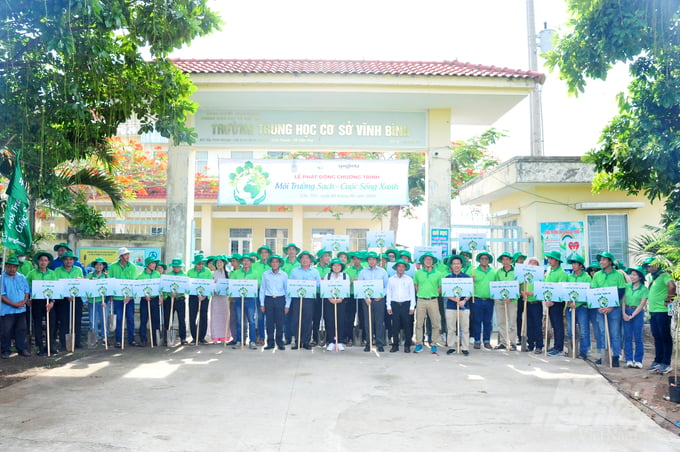
The "Clean Environment - Green Living" program has collected over 30 tons of used pesticide packaging and planted 1,850 trees along rural roads in 2024. Photo: Le Hoang Vu.
On June 5, Syngenta Vietnam Company Limited, in coordination with the Departments of Agriculture and Rural Development in Can Tho city and Dong Thap province, organized a tree planting ceremony and launched the "Clean Environment - Green Living" program in these areas.
Buidling on the success of previous years, the program collected over 30 tons of used pesticide packaging in 2024. Additionally, the program planted 1,550 Hopea odorata and 300 Lagerstroemia speciosa along rural roads.
The program is part of a series of cooperative activities between the Department of Plant Protection and Syngenta Vietnam for the years between 2021 and 2025. The "Clean Environment - Green Living" program aims to promote green lifestyles, enhance environmental consciousness, and contribute to the development of new rural areas.
Within the framework of the program, Syngenta coordinated with local governments to organize the collection of used pesticide packaging in six locations spanning Can Tho city and Dong Thap province. With prior extensive communication efforts, local farmers have actively participated in the collection activity, and delivered the used packaging to designated sites for rewards.
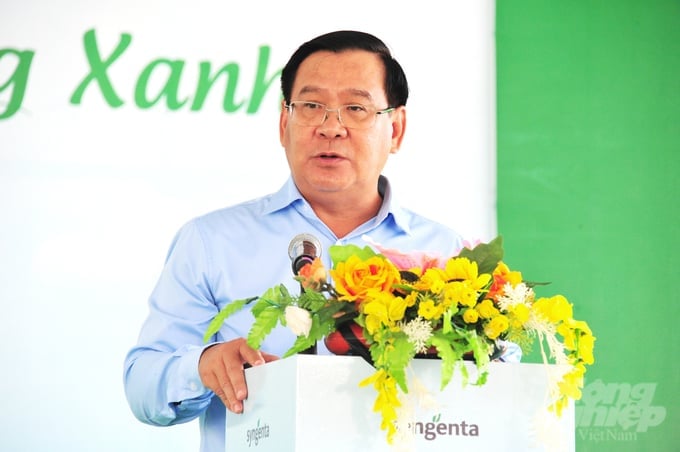
Mr. Tran Thanh Vu, General Director of Syngenta Vietnam Company Limited, believes that the "Clean Environment - Green Living" program has become an annual activity of the company. Photo: Le Hoang Vu.
Used packaging will be collected, transported, and processed by a professional party in accordance with Syngenta's global standards in order to maintain safety, health, and environmental standards. Syngenta Vietnam additionally converts the collected pesticide packaging into trees for planting along rural roads in the two provinces.
Accordingly, with a total of 20 tons of collected pesticide packaging in Can Tho city, Syngenta Vietnam donated 800 Hopea odorata and 300 Lagerstroemia speciosa for planting along the main road in Vinh Binh commune, Vinh Thanh district.
Similarly, with a total of 10 tons of collected pesticide packaging in Dong Thap province, Syngenta Vietnam donated 750 Hopea odorata for planting along the main road in An Hoa commune, Tam Nong district.
In addition to tree planting, the program also hosted road cleaning, garbage removal and weed clearing activities with the cooperation of local residents and Syngenta staff.
Apart from providing shade for the roads, the trees will contribute to transforming the local roads into exemplary rural roads, thereby enhancing biodiversity the coordinated planting of various flowers and ornamental plants.
Notably, the program organized a training program on the effective and safe use of pesticides to help farmers understand the "4 rights," "5 golden rules" principles in pesticide use; proper equipment and usage of personal protective gear; and methods for collecting, sorting, and disposing of pesticide packaging after use.
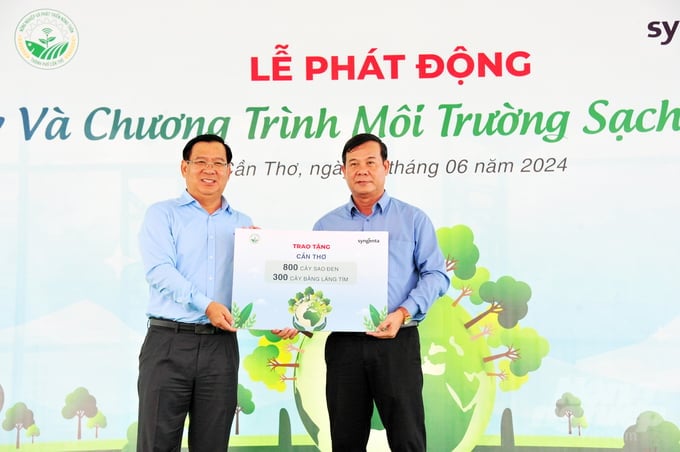
Syngenta Vietnam presenting trees along rural roads in Vinh Thanh district, Can Tho city. Photo: Le Hoang Vu.
As green agriculture slowly becomes a requirement for sustainable development, Syngenta's training activities contribute to changing farmers' approach to environmental protection, and help them improve the effectiveness of pest and disease management; thereby protecting the health of their families and the surrounding community.
"Clean Environment - Green Living" is a notable and practical activity in Syngenta's commitment to sustainable development in Vietnam. Accordingly, Syngenta aims to contribute to building green, clean, and scenic rural landscapes; enhancing community awareness of environmental protection, and collaborating to create a green and sustainable agriculture sector.
As of now, after 10 years of implementation, the program has collected and disposed of over 130 tons of used pesticide packaging, planted more than 3,550 trees, and provided training on the safe and effective use of pesticides for over 30,000 farmers in 15 provinces and cities nationwide.
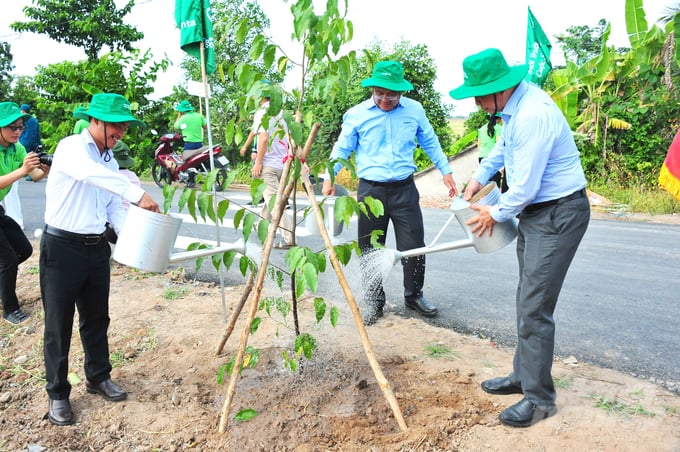
Leaders from the agriculture sector of Can Tho City and Syngenta Vietnam plant trees along rural roads in Vinh Thanh district. Photo: Le Hoang Vu.
During the launch ceremony in Can Tho city, Tran Thanh Vu, General Director of Syngenta Vietnam, stated: "Syngenta associates its brand identity with agricultural development in Vietnam. Consequently, Syngenta will continue to accompany and support farmers, smallholders, as well as maintain and expand practical community-focused activities. By protecting the environment and supporting farmers, Syngenta aims to protect the long-term prosperity of agricultural communities and focus on the sustainable development of agriculture in Vietnam."
"The 'Clean Environment - Green Living' program has become an annual activity for the company, eagerly anticipated not only by local farmers but also enthusiastically supported by Syngenta employees, who wish to contribute their efforts towards the company's major goals," affirmed General Director Vu.
Representing the local government, Tran Thai Nghiem, Deputy Director of Can Tho city's Department of Agriculture and Rural Development, remarked: "We need fundamental changes in the awareness and actions of the local community in order to achieve the goal of sustainable agricultural development and build Can Tho City into an ecological urban area. Namely, we need the joint support of local farmers, businesses and government agencies."
Syngenta's active effort in implementing tree planting initiatives and the "Clean Environment - Green Living" program nationwide has contributed significantly to the development of the agricultural sector. In addition to extensive dissemination activities, the program has provided the local community with an opportunity to take concrete actions and collaboratively build a green, clean, and scenic rural environment.
Nguyen Van Vu Minh, Director of Dong Thap province's Department of Agriculture and Rural Development, commented: "The 'Clean Environment - Green Living' program has created tangible value for local farmers in protecting the environment, understanding the responsible use of pesticides. As a province with a expansive agricultural production areas and high demand for pesticide usage, proper handling of used pesticide packaging is crucial to protect the living environment of rural communities."
Subsequently, Director Minh expressed his hope that the meaningful program will continue to be replicated in other regions, allowing additional farmers in the province to collaborate in building a green, clean, and scenic rural environment.
In compliance with the "Strategy for Sustainable Agriculture and Rural Development from 2021 to 2030" outlined under the Prime Minister's Decision No. 150/QD-TTg, Syngenta Vietnam first introduced the "Clean Environment - Green Living" program in 2015. Accordingly, the company is committed to enhancing training and raising awareness among farmers regarding environmental protection and the responsible use of safe and effective plant protection products.
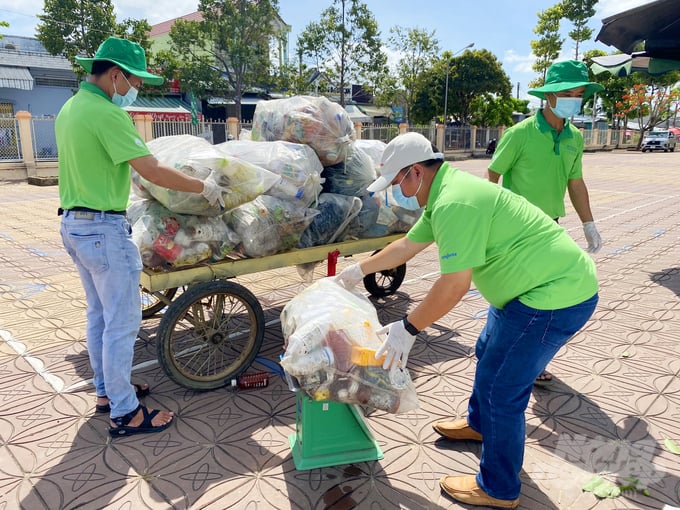
The program has collected over 30 tons of used pesticide packaging from Can Tho city and Dong Thap province in 2024. Photo: Le Hoang Vu.
"Clean Environment, Green Living" is a prime example of Syngenta Vietnam's commitment to rural communities through numerous meaningful activities. Throughout its three decades of operation in Vietnam, alongside pioneering the introduction of advanced crop science solutions and technologies, which improve local production methods and enhance the competitiveness of Vietnamese agricultural products, the company has steadily increased local income levels. By protecting the environment and supporting farmers, stakeholders can protect the long-term prosperity of agricultural communities and Vietnam's economy.
Syngenta Vietnam Company Limited is a subsidiary of Syngenta Group, one of the leading businesses in the agricultural sector that specialize in crop protection and seeds.
With the goal of contributing to global food security, Syngenta aims to enhance sustainability, improve product quality, and ensure the safety of agricultural products with innovative technology solutions on a global scale. Syngenta's technology has enabled farmers to efficiently utilize natural resources and improve global food security.
Syngenta is operating in over 100 countries to transform agricultural practices globally. Through collaboration with partners in the agricultural value chain and through the Sustainable Development Program, Syngenta is committed to advancing innovative activities for farmers and the natural environment. Additionally, the company strives to regenerate the agricultural sector, with a focus on health and safety for the comunity; and cooperate to generate a greater impact.
Translated by Nguyen Hai Long
![Reducing emissions from rice fields: [2] Farmers’ commitment to the soil](https://t.ex-cdn.com/nongnghiepmoitruong.vn/608w/files/news/2025/05/05/dsc08881jpg-nongnghiep-140632.jpg)
(VAN) Clean rice cultivation model in Thuong Tan commune, Bac Tan Uyen district, is assisting local residents in achieving sustainable agriculture by substantially reducing costs, increasing productivity, and protecting the environment.

(VAN) At the conference to disseminate Resolution No. 68, AgriS introduced its digital agricultural ecosystem and reaffirmed its commitment to accompanying the Government in promoting private sector development and sustainable agriculture.

(VAN) 'Blue Ocean - Blue Foods' initiative is designed to restore marine ecosystems and establish sustainable livelihoods for local communities by cultivating a minimum of 1,000 hectares of cottonii seaweed in the first three years.
/2025/05/21/4642-3-112707_603.jpg)
(VAN) The V-SCOPE project has made direct contributions to three out of six pillars of the Comprehensive Strategic Partnership between Vietnam and Australia.

(VAN) Facing the threat of rabies spreading to the community, Gia Lai province urgently carries out measures to vaccinate dogs and cats on a large scale.

(VAN) Disease-free livestock farming not only protects livestock herds but also stabilizes production and livelihoods for many farmers in Tuyen Quang.

(VAN) Japan's grant aid project contributes to capacity building, promoting organic agricultural production, and fostering sustainable community development in Dong Thap province.